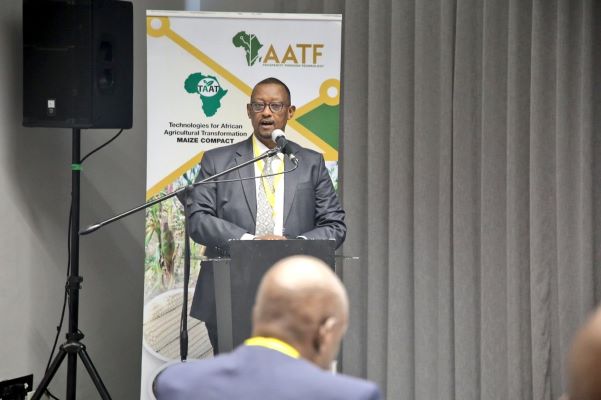African Agricultural Technology Foundation (AATF) has reiterated its commitment to deliver transgenic drought-tolerant and insect-protected maize varieties to caution African farmers from the impact of climate change on their productivity and enhance their livelihood.
AATF director, Dr. Canisius Kanangire, reaffirmed the commitment while addressing the 5th TELA maize project annual review and planning meeting held in Mpumalanga, South Africa this month.
The purpose of the meeting was to review the progress and achievements attained in the fourth year of the project implementation and prioritise areas of focus for the fifth year.
Kanangire pointed out that farmers in South Africa were already benefiting from stem-borer and fall armyworm resistant maize varieties derived from the TELA project.
“This technology has undergone regulatory approval in four other countries and will soon be available to farmers in Ethiopia, Kenya, Mozambique, and Nigeria.
The TELA maize project is the result of a decade of breeding work under the Water Efficient Maize for Africa (WEMA) partnerships that begand in 2008,” he said.
“Our successes in environmental release of TELA products in Ethiopia, Nigeria, Kenya, and Mozambique over the last three years are a course for celebration. In the coming year we are looking forward to moving towards commercialisation of TELA varieties in all our target countries,” he added.
Kanangire noted that long-term public-private partnerships are critical in strengthening the maize value chain in Africa, which in turn can contribute to food security, economic productivity, and prosperity of farmers.
“Smallholder farmers face numerous challenges at the farm level, and one of the significant hardships they encounter is pest and disease infestations. For maize farmers, the Stem borer and the Fall armyworm have become significant obstacles to improving productivity in recent years,” he observed.
Frequent drought because of climate change, use of harmful pesticides, and low productivity due to degraded soil nutrients, are some of the persistent challenges facing the agriculture sector in Africa.
The infestation of pests and diseases can lead to reduced yields, crop damage, and even complete crop loss, which can have severe economic consequences for smallholder farmers. The cost of controlling pests and diseases can also be prohibitive for many smallholder farmers, further exacerbating the problem.
To address these challenges, TELA project is working towards commercialisation of transgenic drought-tolerant and insect-protected maize varieties to enhance food security in Sub-Saharan Africa.
Speaking at the same event, Lawrence Kent from the Bill and Belinda Gates Foundation, and Dr. Faith Tarr from the United States Agency for International Development (USAID), lauded the TELA project team for following up the objectives of TELA Maize Project of addressing farming challenges facing maize farmers in Africa.
The TELA Partnerships is coordinated by AATF, an organisation that facilitates public-private partnerships for access and delivery of appropriate technologies to farmers in SSA. The other partners in the project include the national agricultural research systems in Ethiopia, Kenya, Mozambique, South Africa, Nigeria, Tanzania and Uganda, the International Maize and Wheat Improvement Centre (CIMMYT), and Bayer Crop Science.








